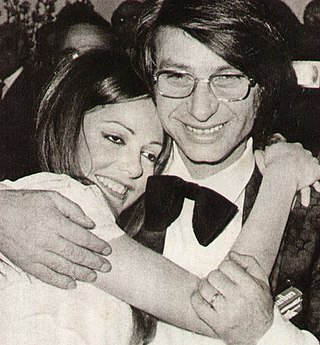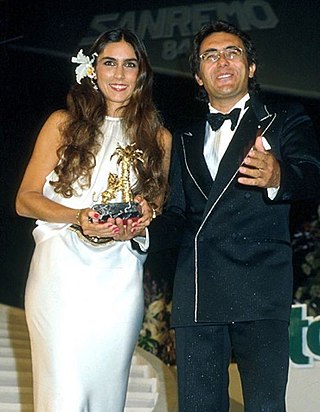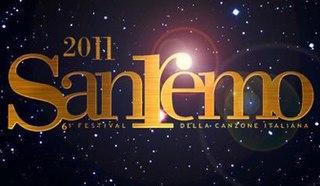
Enrico Ruggeri is an Italian singer-songwriter.

Nicola Di Bari is an Italian singer-songwriter and actor. He is considered one of the "sacred monsters" of Italian pop music.

"Nel blu, dipinto di blu", popularly known as "Volare", is a song originally recorded by Italian singer-songwriter Domenico Modugno. Written by Modugno and Franco Migliacci, it was released as a single on 1 February 1958.

Francesco "Franco" Battiato was an Italian musician, singer, composer, filmmaker and, under the pseudonym Süphan Barzani, also a painter. Battiato's songs contain esoteric, philosophical and religious themes, and have spanned genres such as experimental pop, electronic music, progressive rock, opera, symphonic music, movie soundtrack, oratorio and new wave.

Lucio Dalla was an Italian singer-songwriter, musician and actor. He also played clarinet and keyboards.
"Caruso" is a song written by Italian singer-songwriter Lucio Dalla in 1986. It is dedicated to Enrico Caruso, an Italian tenor. Following Lucio Dalla's death, the song entered the Italian Singles Chart, peaking at number two for two consecutive weeks. The single was also certified platinum by the Federation of the Italian Music Industry.

Al Bano and Romina Power are an Italian-American pop music duo formed in 1975 by then-married couple Italian tenor Albano Carrisi and American singer Romina Power, the daughter of Hollywood actor Tyrone Power. They have recorded over 22 albums, which have sold in 150 million copies across six decades. Their best known international hits include "Felicità", "Sharazan", "Tu, soltanto tu ", "Ci sarà", "Sempre sempre", and "Libertà!". They participated twice in Eurovision Song Contest in 1976 and 1985 and performed five times at Sanremo Music Festival, winning in 1984 with the song "Ci sarà". The couple also shot seven films, based on their songs, between 1967 and 1984. The two separated and divorced in 1999, but reunited professionally in 2013.

Francesco De Gregori OMRI is an Italian singer-songwriter. In Italy, he is popularly known as "Il Principe dei cantautori", a nickname referring to the elegance of his lyrics.

Gianni Morandi is an Italian pop singer, actor and entertainer.

Anna Hoxha, known professionally as Anna Oxa, is an Italian singer, actress, and television presenter. Oxa has received mainstream popularity and recognition within Italy due to her numerous participations in the Sanremo Music Festival.

Patty Pravo is an Italian singer. She debuted in 1966 and remained most successful commercially for the rest of the 1960s and throughout the 1970s. Having suffered a decline in popularity in the following decade, she experienced a career revival in mid-late 1990s and reinstated her position on Italian music charts. Her most popular songs include "La bambola" (1968), "Pazza idea" (1973), "Pensiero stupendo" (1978), and "...E dimmi che non vuoi morire" (1997). She scored fourteen top 10 albums and twelve top 10 singles in her native Italy. Pravo participated at the Sanremo Music Festival ten times, most recently in 2019, and has won three critics' awards. She also performed twelve times at the Festivalbar.

Mango, stage name of Giuseppe Mango, was an Italian singer-songwriter and musician. He was known for his style which fuses pop, rock, folk, world music and for his extensive vocal range. He is best known for the song "Oro", from his 1986 breakout album release Odissea. Other hits include "Lei verrà", "Mediterraneo", "Bella d'estate", "Amore per te", "Come Monnalisa", "Nella mia città" and "La rondine".

"Pridi, dala ti bom cvet" is a song that served as Yugoslavia's entry at the Eurovision Song Contest 1970. The song marked the third of four occasions in which Yugoslavia's entry was performed in Slovene. It was sung by 18-year-old Slovenian music newcomer Eva Sršen.

The Sanremo Music Festival 2012, officially the 62nd Italian Song Festival, was the 62nd annual Sanremo Music Festival. It was held at the Teatro Ariston in Sanremo, province of Imperia, during the five nights between 14 February 2012 and 18 February 2012, and it was broadcast by Rai 1.

The Sanremo Music Festival 2011, officially the 61st Italian Song Festival, was the 61st annual Sanremo Music Festival, held at the Teatro Ariston in Sanremo, province of Imperia, during the five nights between 15 February 2011 and 19 February 2011. The artistic director of the show was Gianmarco Mazzi. Broadcast by Rai 1, the festival was presented by Gianni Morandi with Paolo Kessisoglu, Luca Bizzarri, Belén Rodríguez and Elisabetta Canalis.
"Spaccacuore" is a song written by Italian singer-songwriters Samuele Bersani and Lucio Dalla, together with Giuseppe D'Onghia. The song was recorded by Bersani for his 1995's second studio set Freak, and it was released as the album's second single in 1995. The song later became one of his best-known songs in Italy.

The musicarello is a film subgenre which emerged in Italy and which is characterised by the presence in main roles of young singers, already famous among their peers, and their new record album. In the films there are almost always tender and chaste love stories accompanied by the desire to have fun and dance without thoughts. Musicarelli reflect the desire and need for emancipation of young Italians, highlighting some generational frictions. The genre began in the late 1950s, and had its peak of production in the 1960s.

The Sanremo Music Festival 2014, officially the 64th Italian Song Festival, was the 64th annual Sanremo Music Festival, a televised song contest held at the Teatro Ariston in Sanremo, Liguria, between 18 and 22 February 2014 and broadcast by Rai 1. Fabio Fazio and Italian comedy actress Luciana Littizzetto presented the show, which was based on the same rules adopted for the previous contest. Competing artists were split in two different sections—Big Artists and Newcomers. The Big Artists section included 14 established Italian artists. During the first and the second night of the show, each act performed two songs, and only one song per act was allowed to continue the competition, as a result of votes received by public and journalists. After the third night, Riccardo Sinigallia's entry, "Prima di andare via", was disqualified for being performed during a concert preceding the competition. During the final night, Arisa's "Controvento" was announced as the winning song for the Big Artists section of the contest. The Newcomers' section featured eight songs performed by debuting or little known artists. The winning entry, Rocco Hunt's "Nu juorno buono", was announced during the semi-final of the contest.

Stadio is an Italian pop rock band formed in 1977. The members are Giovanni Pezzoli (drums), Roberto Drovandi, Andrea Fornili (guitar), and Gaetano Curreri.

"Nessun grado di separazione" is a song recorded by Italian singer Francesca Michielin. Written by Michielin herself along with Cheope, Federica Abbate and Fabio Gargiulo; the song was produced by Michele Canova. Placed second in the Sanremo Music Festival 2016, the song released as a single from the reissued version of Michielin's second studio album, di20are. A bilingual English and Italian version of the song called "No Degree of Separation" represented Italy in the Eurovision Song Contest 2016 held in Stockholm, Sweden.

















